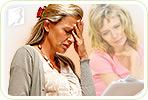There are drugs available to help people through depression. Menopause doesn't directly cause menopause, but it can lead to mood swings and irritability. These symptoms along with the stress of going through menopause, may trigger depression, especially in women who are already prone to the mental health condition.

There are a number of different prescription drugs with an ample range in potency and effectiveness. It is a good idea to talk to your doctor and get an accurate diagnosis if you feel like you are suffering from depression. Therapy, prescription medicine, and other treatments can go a long way to help a person conquer their depression.
Reasons for Depression
Depression should not be seen as a normal part of aging or menopause. Depression is a serious medical condition, and if you feel like you have it is important to seek treatment.
Depression can happen due to genetic factors. For example, if you have family members who are more prone to suffering from depression, than you are also more likely to suffer from depression.
Menopause ends a woman's reproductive ability, is a sign of aging, and can also cause changes in physical appearance. These things can be stressful and overwhelming at times, and may lead to depression.
However, there are many reasons a menopausal woman may be depressed that has nothing to do with menopause. Stress at work or at home, the death of a loved one, relationships problems, financial strain, or excessive loneliness can all cause depression.
Common Symptoms of Depression

Mood disorders are thought to be caused by chemical changes in the brain. However, there is much more that can be learned about the exhaust causes of depression. The following symptoms can be a part of depression:
- Depressed mood most of the day
- Difficulty concentrating
- Loss of interest or pleasure in activities that are usually enjoyed
- Feelings of guilt or worthlessness
- Fatigue or lack of energy
- Restlessness or feeling slowed down
- Trouble sleeping or sleeping too much
- Recurrent thoughts of death or suicide
If you are contemplating suicide or self-harm, or you have contemplated either or those things, it is important to seek help immediately. Talking to your doctor, therapist, or a close friend or family can help. There are also online support groups and phone lines that you can call to get help.
Treatments for Depression
Many people tout the benefits of herbal supplements that are meant to help with depression. There is little evidence supporting the claims of most herbal supplements meant to help with depression, so take supplements with caution. It is important to talk to a doctor before taking medicinal doses of herbal supplements.

A doctor may recommend that you talk to a therapist, or that you take anti-depressants. There are several different antidepressants available, so your doctor will be able to help you choose the right one to take. Click to learn more about depression during menopause.
Sources
- Kahn, D.A.; Moline, M.L.; Ross, R.W.; Altshuler, L.L.; & Cohen, L.S. (2008). Depression during the transition to menopause: A Guide for Patients and Families. Retrieved November 9, 2015, from https://womensmentalhealth.org/wp-content/uploads/2008/04/menopause_guide.pdf
- Cleveland Clinic. (201). Emotional Aspects of Menopause. Retrieved November 9, 2015, from https://my.clevelandclinic.org/health/diseases_conditions/hic-what-is-perimenopause-menopause-postmenopause/hic-emotional-aspects-of-menopause



